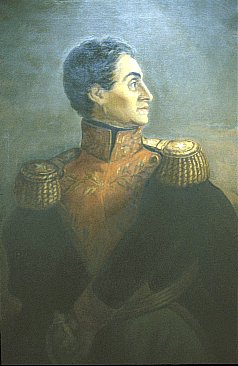|
|
Post-Independence
Ironically, the expulsion
of the exploitive Spanish colonial governments was a catastrophe for the
Quichua. Wealthy hacendados and later idealistic Liberals continually
reduced the Quichuas' standard of living throughout Ecuador's independence.
Ecuador's situation mirrored the experiences of most Latin American nations.
The abuses of the republican era provided the basis for the emergence of
indigenous rights movements in recent years.
|
In the year 1808, Napoleon
Bonaparte, emperor of France, invaded Spain and deposed its king, Ferdinand
VII. Tired of two centuries of Spanish mercantilist colonial policy,
many Latin American nations used this pretext of a “false” king on the
Spanish throne to declare their independence. This action touched-off
a fourteen-year war for independence by the many former viceroyalties of
Spanish America. On August 10, 1809 a group of patriots led by Juan
Pío Montúfar announced Quito’s independence from Spain.
In 1811 an assembled congress established the state of Quito and by February
1812 a constitution was drafted and approved. The Spanish reprisal
came quickly, however, once Napoleon was defeated, and Ecuador was reincorporated
into the empire. For the Quichua, this was a period of uncertainty.
Should they support the Spanish, their original oppressors, the American-born
Creoles that owned the haciendas they toiled on, or should they do nothing
and stay aloof of this conflict?

For Ecuador, the campaigns
of Simón Bolívar liberated them from the Spanish Empire.
Specifically, Bolívar’s lieutenant, Antonio de José Sucre,
led an army into Ecuador and defeated the Spanish viceroy at Pichincha
in 1822. Bolívar united the provinces of Venezuela, Colombia,
and Ecuador into the Federation of Gran Colombia. Bolívar
hoped the federation would be the starting point for a united Spanish-American
nation. In 1830 Gran Colombia was dissolved and Ecuador became
a separate nation.
In republican Ecuador
the criollos, pure Spanish or mestizo wealthy landowners held the vast
majority of political power. Indigenous peoples continued to be exploited
for their labor on haciendas and in mines. Politically, the
country ebbed and flowed between democracy and dictatorship over its 170-year
existence. The dictators and presidents were called caudillos, strongmen
or military leaders that assumed complete power in the nation. The
first caudillo was General Juan José Flores who held power until
1845. The next caudillo was General Gabriel García Moreno,
who reigned as president on two separate occasions and was assassinated
in 1875.
During the nineteenth
century, much of the political chaos in Ecuador stemmed from the conflict
between the city of Guayaquil on the coast, and the city of Quito in the
highlands. The people on the coast wanted to expand Ecuador’s trade
and exports, they wanted to bring about a more capitalistic system to Ecuador.
Life in the highlands was still dominated by the large farm and the influence
of the Church. Like in many Latin American countries during this
period, these two philosophies became enshrined as Liberalism and Conservatism.
In 1895, with General Eloy Alfaro won the presidency, the Liberals finally
assumed power in Ecuador. With the Liberals in power, the Quichuas
way of life steadily worsened. The Church, now protectors of Indian
land, was stripped of its lands—which were quickly snatched-up by wealthy
hacendados. Special privileges under the law allowing Quichuas to
maintain their traditional communities were thrown out. Many Quichua
found themselves now reduced to true peonage, a state they had not known
since the arrival of the Spanish conquistadors.
Works Consulted
Fisher, Lillian Estelle. Viceregal Administration in the Spanish-American
Colonies. New York: Russell & Russell, 1967.
Jackson, Robert H. Race, Caste, and Status: Indians in Colonial
Spanish America. Albuquerque: University of New Mexico Press, 1999.
Lepthien, Emilie U. Ecuador. Chicago: Regensteiner Publishing
Enterprises, Inc., 1986.
Lucas, Eileen. European Conquest. Vero Beach, FL: Rourke
Publications, Inc., 1995.
Return to top
Page created by Brian Malone,
Ryan Koonce, and Lori
Schwartz.
